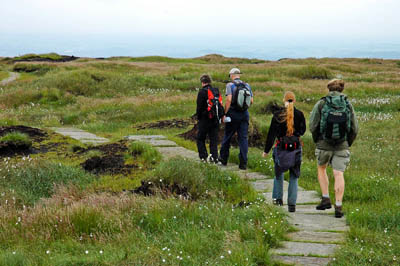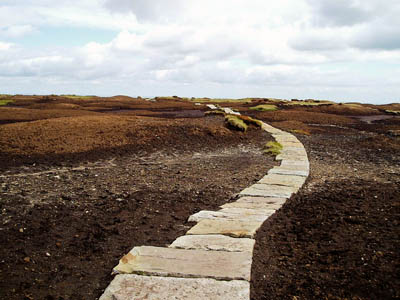
Walkers on Black Hill in the Peak District after a previous restoration project
A massive project to regenerate some of the country’s most important moorland will go ahead after the European Union pledged £5½m to safeguard stretches of upland in the Peak District and South Pennines.
Helicopters will be used to spread seed from the air to reintroduce rare plants that have been slowly destroyed by centuries of pollution from neighbouring industrial cities and by a succession of wildfires. Six full-time jobs and up to 40 seasonal posts will be created in a scheme that will see an improvement for walkers across the peat moorlands of the area.
Edale-based Moors the Future Partnership secured the money from the EU Life+ fund for its Moorlife scheme, which it says will turn black, eroded wilderness into green landscapes.
The area which will benefit covers more than 810ha (2,000 acres) of land which has a major influence on surrounding areas as well as being popular with walkers.
Bleaklow, Shelf Moor, Sykes Moor, Alport Moor, Black Hill, Rishworth Common, Higher House Moor and Turley Holes are among the moors that will benefit from the work, which will also reduce flood risk to surrounding cities by absorbing downpours, purify water supplies and help retain carbon dioxide and thereby mitigate some of the climate-change effects.
Helicopters will also fly in equipment, fertiliser and plug-plants for the work. Highly absorbent plants such as sphagnum moss will be planted, along with heather, cottongrass, bilberry, crowberry and cloudberry. Work is due to start in April next year.
Much of the land is owned by the water companies Yorkshire Water and United Utilities, serving as catchment areas for their reservoirs, while the rest is owned by the National Trust and private landowners.

Black Hill before restoration
Geoff Nickolds, chair of the Moors for the Future Partnership, said: “We’re delighted to have secured this vital backing for the Moorlife project which will restore habitats of European significance.
“It will have important benefits for communities on both sides of the Pennines in terms of lower flood-risks and improved water supplies, and we expect it to create up to 40 seasonal jobs and six full-time posts for its five-year duration.
“It will also restore these wild, biologically-important landscapes to a state where they can be enjoyed rather than endured by walkers, with benefits for health and well-being. And we hope it will once again support a wide diversity of upland birds, plants, mammals and insects that specialise in this distinctive habitat.
“Moorlife will complement other programmes including Natural England’s Environmentally Sensitive area scheme, as well as flood-management work for Defra and the Environment Agency, expected to be launched in the near future. Ambitious projects like these, across such vast landscapes, would be impossible without practical and financial co-operation between large organisations who share the same vision and commitment, and we are grateful to them all.”
The Peak District National Park Authority, Natural England, the National Trust, Royal Society for the Protection of Birds, Severn Trent Water, United Utilities, Yorkshire Water, Derbyshire County Council and the Environment Agency are all partners in Moors for the Future, which began life in 2002.
Steve Gilchrist
18 September 2009Surely this is only moorland because it is kept this way by the landowners so they can make money from people who enjoy killing grouse. If there are grants available they should be to restore it to it's natural woodland state and not maintain this unnatural grouse moor for the benefit of a select few.